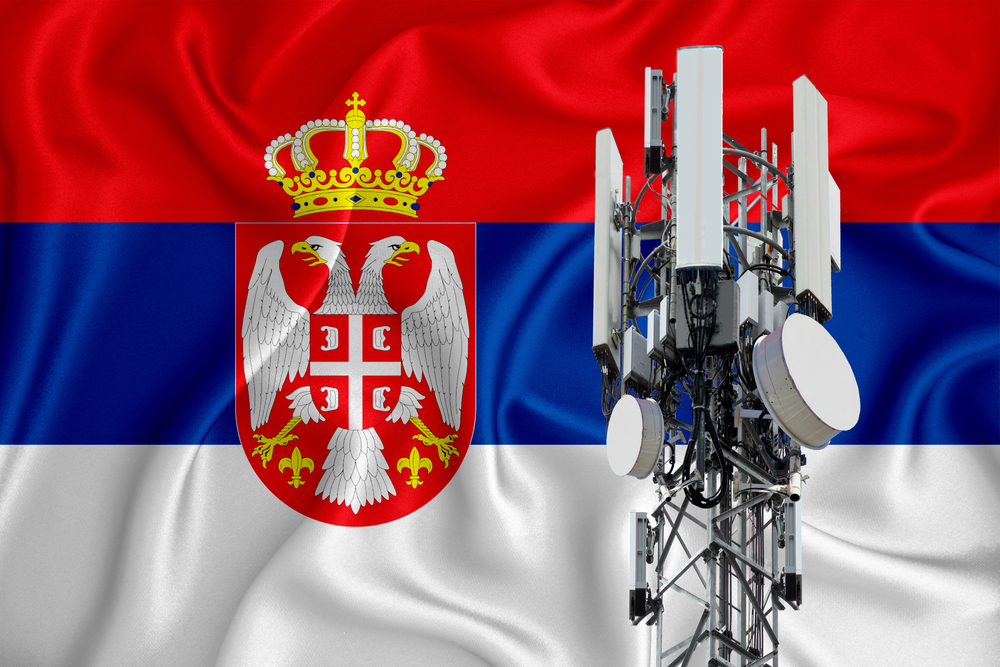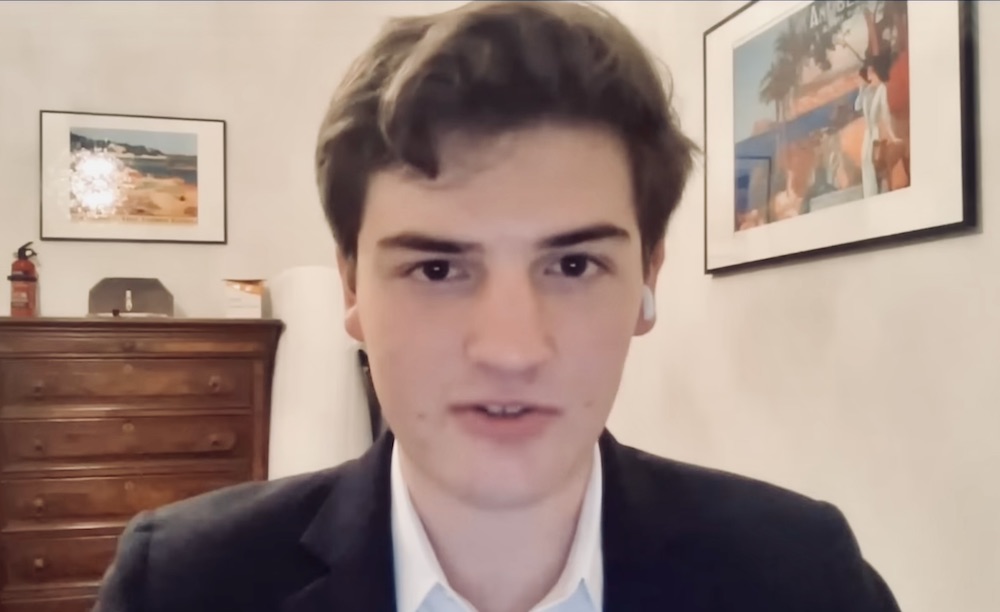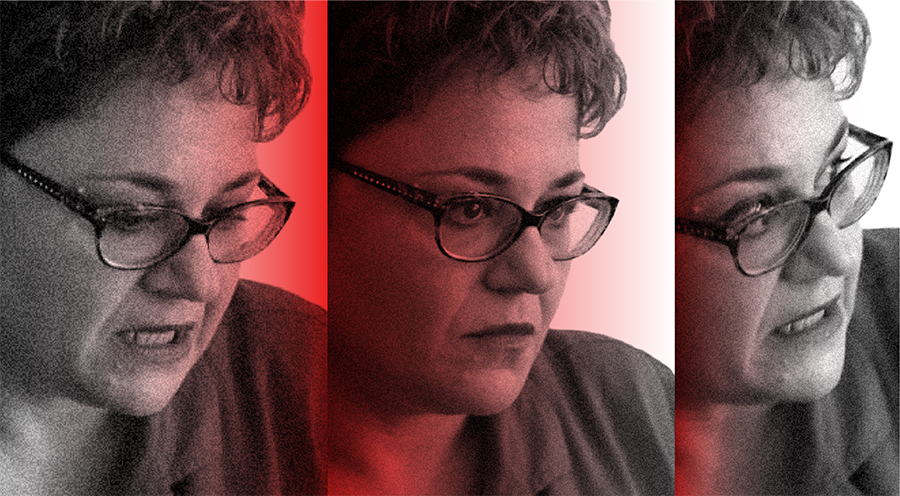
Ana Brnabić (Snimak ekrana, N1)
Two milestone laws that define the Serbian media landscape – the Law on Public Information and the Media and the Law on Electronic Media – were passed on November 4 after three days of stormy debate in the Serbian parliament.
This followed a groundbreaking eight-hour meeting on October 17 between the Prime Minister of Serbia, Ana Brnabić, and media community representatives in the media reform working group, convened by the OSCE Mission in Serbia.
It would be an understatement to say that the session in the parliament was boisterous and unrestrained. Once again, the highest interests of politics in Serbia’s polarized society clashed over the media scene. In the end, the Law on Public Information and Media was voted by a majority of 142 MPs, the Law on Electronic Media was passed by a majority of 144 out of 250 MPs.
Elements of both reforms had been strongly criticized by domestic and international media freedom and journalist organizations for deviating from the previously-agreed Media Strategy. In the final text, some positive compromises were reached and many of the most problematic aspects of the draft laws were removed.
However, one of the most controversial elements of the text remained. Under the new laws, the state of Serbia – through the state telecommunications operator Telekom Serbia – will once again be able to legally and officially own media outlets.
While the text of the new Law on Public information and Media states that “publishers or producers of media content” “may not be founded, directly or indirectly” by either state provincial or local authorities, it included an important exception. This loophole would be for cases in which the founder of the media outlet is “a for-profit corporation carrying out electronic communication activities, in accordance with the law governing electronic media, provided that it is not a state aid beneficiary within the meaning of the Law on Ratification of the Stabilization and Association Agreement” with the EU.
In practice, this exception will allow the state to own media indirectly, via Telekom Serbia. Press freedom advocates fear that this ability for the state-owned telecoms company to purchase and own media will hand the government greater indirect influence and control over the influential television market. This would risk distorting the media market by an uneven playing field for media companies, as well as posing the risk of undue political influence.
The strategy
In reality, Telekom Serbia had already been the owner of media outlets in the country for some years. The first news channel to be 100% owned by a subsidiary of state-owned Telekom Serbia was Euronews Serbia, which began broadcasting in 2021.
Two years earlier in 2019, the Euronews company, headquartered in France, announced that it would launch Euronews Serbia during the official visit of French President Emmanuel Macron to Belgrade.
This was not strictly in accordance with the law of the time, but a way was found. The Regulatory Authority for Electronic Media (REM) at the time argued that this was not in breach of the law against state ownership of media since Euronews was not owned directly by Telekom, but by a Telekom subsidiary, Arena Channels Group. It was furthermore held that Telekom itself was a joint stock company, where the state was not directly the sole shareholder.
However, the Strategy for the Development of the Public Information System (the Media Strategy) adopted by the government of Serbia in 2020, after extensive consultations with the media community, had the clearly stated objective of ending public ownership of media. With the passing of the Law on Electronic Media and the Law on Public information, this objective was abandoned.
The issue of public ownership of media outlets, in this case Telekom, is further complicated by the fact that Telekom is the largest cable operator in Serbia. There is concern that Telekom might abuse its position of control over cable networks to disadvantage independent media outlets.
Television stations with national coverage are offered by all cable operators. However, in Telekom Serbia’s cable offer, there are no news channels that are part of United Media Group, which is critical of the government. United owns channels such as N1, which is seen as being one of the most independent channels in the region.
These concerns underscore the importance of securing a level competitive playing field for all media outlets and the need for a truly independent and objective regulatory framework.
Pacta Sunt Servanda – Agreements are legally binding
The process of adopting the Media Strategy began back in 2017. Until the adoption of the law, it was a marathon with unexpected obstacles, five-and-a-half years long and more than 100 long-lasting meetings. So long, that in the meantime the ministry responsible for drafting the law has changed its name and reshaped its jurisdiction.
“Regarding the enabling of Telekom, which is majority owned by the state, to establish a media outlet, the question arises as to why this is being done”, said Maja Sever, president of the European Federation of Journalists (EFJ). “This arouses suspicion that the way will be opened for the establishment of new media owned by Telekom, which no one knows what they could be doing.”
Sever, a respected Croatian journalist, reminded that “countries in our region cannot be compared to countries with a high level of democratic culture, and the social context in which something happens is always important.”
The International Press Institute (IPI) also supported the positions of the Serbian Coalition for Media Freedom, which consists of the Media Association, the Online Media Association, the Independent Association of Journalists of Vojvodina, the Independent Association of Journalists of Serbia, the Business Association of the Association of Local and Independent Media “Local Press” and Slavko Ćuruvija Foundation.
The day before the vote on the laws, on October 25, the Coalition for Media Freedom collected more than 7,000 signatures in less than 24 hours to delete the articles of the law that allows state-owned companies like Telekom Serbia to own media outlets.
The coalition also urgently called for the introduction of provisions that enable judicial and civil control of the actions of the Regulatory Authority for Electronic Media (REM) following complaints from citizens and organizations.The proposal was not taken into consideration and laws were passed a day later.
The President of the European Commission, Ursula von der Leyen, congratulated Serbia. “As far as media freedom is concerned, you have just completed important reforms by adopting the Law on Electronic Media and the Law on Public Information and Media. Congratulations on that and now you should implement it and continue working on it”, she said.
The European Commissioner for Enlargement, Olivér Várhelyi, also congratulated the Prime Minister of the Republic of Serbia, Ana Brnabić, in a letter, stressing that “he recognizes many good elements in both draft laws”.
Others were less welcoming. “In Serbia, we have new media laws that will affect the consolidation of the media market and contribute to one narrative being dominant,” said Aleksandra Karpi, from the organization Freedom House. Visiting the Faculty of Political Sciences of the University of Belgrade on November 13, she added that media freedom in the countries of the Western Balkans is worrisome.

European standards vs Serbian reality
The importance of media ownership for political survival can be seen from the resistance that certain countries have toward the EU’s draft European Media Freedom Act (EMFA)
Nevertheless, the European Union told Serbia during the negotiations over the laws that on the issue of public ownership of media outlets there is no Acquis Communautaire or common EU policy.
However, as Tamara Filipović Stevanović, general secretary of The Independent Association of Journalists of Serbia (NUNS), points out, “there is no understanding of heritage and habits in Serbia in relation to EU countries in Brussels “.
For example, except in the case of ORF, the Austrian public broadcaster, the Austrian government is not a majority media owner. While the Serbian authorities pointed out that through the Austrian telecoms operator A1, the state has ownership, the other side reminds that the majority owner of A1 is Carlos Slims – América Móvil – with a 56.6 percent share in ownership, while Austria through the Ö BAG holding has 28.4 percent minority ownership share.
In Sweden meanwhile, apart from the television channels that are broadcast as part of the public service, the state is indirectly, through the state owned telecommunications operator TELIA – the owner of a share in TV4. However, unlike Serbia, Sweden has long enjoyed high levels of respect for civil, political and media freedoms.
The Serbian state has a majority stake in the telecommunications company Telekom Serbia, which through its affiliates Arena Channels Group and MTEL Swiss SA from Switzerland own as many as 20 TV channels, of which Arena Sport, Euronews Serbia and Bloomberg Adria are the most prominent. None of these channels have a national coverage, but are shared via cable networks.
In addition, the extent of the financial contribution by Telekom Serbia to other third party media outlets is still unknown, considering that the data on carriage fees and advertising are not publicly available.
The new laws essentially allow Telekom Serbia to expand its influence and to buy and establish media. There are fears that by spreading its media portfolio, Telekom Serbia will gain market dominance and also political influence.
“The controversial articles of the law are lex specialis for Telekom Serbia”, points out Filipović Stevanović, from NUNS. “Excessive state influence in the media can open a Pandora’s box of narrowing media pluralism and diversity of content. There is no limit.
“The state says that teleoperators are also entering the media market in the world, but the difference is that they do not interfere in making news. Based on our experience, we see this as a great danger. I’m not sure if they don’t understand that in Brussels or if it’s a political game by trading media freedom for the sake of other interests. But Telekom Srbije’s influence is also in the EU’s backyard, for example, in Slovenia and Croatia.”
Regulatory failures
Concerns about increased government control over television in Serbia are deepened by the lack of independence at the country’s main media regulator.
In 2022, the Regulatory Authority for Electronic Media (REM) issued four national frequencies for eight years, exclusively to media that support the policy of the government of Serbia, and which have also previously had these national frequencies.
These television stations, among other things, launch campaigns against investigative and critical journalists, broadcast reality programs that abound in violence, and on some of them regular guests are people convicted of war crimes and sympathizers of the former president of Serbia, Slobodan Milošević, who led the country into bloody wars in the 1990s.
Fililpović Stevanović, general secretary of The Independent Association of Journalists of Serbia (NUNS), said that more than 60 per cent of Serbian citizens are informed through television, and that those broadcasters with national coverage have a huge influence on the formation of public opinion.
“If the public does not have the information it needs to make decisions on a daily basis, it is a huge problem for this society. Telekom would not be such a problem if the REM did its job. The REM is also the biggest culprit for the captivity of the media and the media content. The REM does not conduct analyses, does not react to hate speech, even to obvious violations of the law on advertising,” Filipović Stevanović points out.
In the REM, these decisions are made by nine members of the REM Council. That is precisely why, in the process of drafting the law, there was a lot of controversy regarding the fate of the mandate of the current members of the Council. In the end, it was agreed that the composition of the REM Board will be reconstituted, according to the new law, within one year from the entry into force of the Law on Electronic Media.
Demands for change
Citizens of Serbia have for years been demanding the cancellation of reality shows that promote violence. Three years ago, an initiative “In the name of culture” submitted a request to the Serbian Parliament with 113,459 signatures calling for such problematic reality shows to be limited. When it comes to violence in the reality shows, the finger is mostly pointed at TV Pink.
Established during the regime of Slobodan Milošević, TV Pink was given a national coverage in the first years of the democratic government and continues today to have a license for national coverage, despite not fulfilling the stated requirements for such a license, in addition to controversial programs, not only because of all-day reality shows.
Under public pressure, in 2020 the REM’s administration drafted a rulebook that would limit the duration of reality shows, but the REM Council voted against it.
In May of this year, after two mass murders in Serbia in which 18 people died, most of them children, one of the most important demands of the mass protests – Serbia Against Violence – was the ban on reality shows that promote violence.
A proposed article concerning the protection of minors and human dignity in connection with the broadcasting of reality shows was included in the proposal of the Law on Electronic Media when it was sent to the Serbian Parliament for adoption. TV Pink appealed.
Behind the back of the media community and the working group that developed the law, during the night session of the Parliamentary Committee for Culture and Information, article 68 was erased. It was explained that everything would be solved by secondary legislation.
Four days after the entry into force of this law, TV Pink broadcast the DNA program – in which a child’s paternity is established as a form of public entertainment. The TV station violated the newly adopted article of the new Law on Electronic Media which prohibits the broadcasting of content “aimed at establishing the identity of a minor’s parents (e.g. disputing or establishing paternity or maternity), regardless of whether the child is under parental care”.
The Slavko Ćuruvija Foundation, which bears the name of a journalist killed in 1999 for free speech and opposition to the regime of Slobodan Milošević, submitted a complaint to the REM.
The same foundation recently published an analysis of how much from TV Pink’s program commitment, based on which REM renewed its broadcasting license with national coverage in 2022, is actual TV content. The analysis showed that Pink did not fulfill more than half of the programming commitments made to the regulator.
Press Council
In the Law on Public Information and Media, there is another provision of importance for the media community:the role of the Press Council – whose decisions on violations of the ethical code of journalists will now be one of the criteria for awarding public money to the media. Serbia will now be one of very few European countries that incorporates the Press Council in legislation as the only recognized self-regulatory body.
According to the previous data of the Press Council, daily newspapers in Serbia violated the Code of Journalists of Serbia in 2715 different articles published between October 1, 2022 and January 31, 2023.
The most violated chapter includes the presumption of innocence, unmarked advertising, publication of inappropriate and pornographic content, violation of ethics related to the truthfulness of expression and the right to privacy, as well as a disclosure of children’s identity. At the same time, the code was most often violated by the media which are significant beneficiaries of state money.
In the limited media market of Serbia, allocation of funds from public money is one of the ways of economic survival, and is especially important for small local media.
The new law establishes a Unified Information System in which data important for project co-financing of the media will be visible, including insight into produced media content and allocated funds.
The Law on Public Information and Media introduces the scoring of their experience and expertise when selecting members of commissions for project co-financing, which is an extremely important way in which the media is still financed.
News articles published in print media must be signed with the name and surname, pseudonym or initials of the author or group of authors. The provision is important for several reasons, and one of them is phenomena of unsigned articles that target and attack critical journalists.
“We tried to plug all the leaks we saw in the implementation of the previous law”, said Filipović Stevanović. “Although, even before, a more transparent and responsible management of public money was foreseen, but this was not the practice. Out of fear, we over-standardized some things in the law, described them in such detail, fearing that they would be misused as they were before. The key is implementation”
Fight for media freedom continues
In the most recent country report on Serbia, the European Commission noted “limited progress” in terms of media freedom. Looking back on the subject of media laws, it primarily dealt with the legislative process rather than the content of the law. The emphasis was placed on the independence of REM and lack of transparency of the ownership of media.
However, on the issue of freedom of expression the European Commission found that “limited progress” has been made although police and the prosecution services in some cases of attacks and threats against journalists reacted swiftly – cases of threats, intimidation, hate speech and violence against journalists remains a concern.
“Recurrent statements by high-level officials on the daily and investigative work of journalists provide a challenging environment for the exercise of freedom of expression”, it concluded in the report.
According to the Independent Journalist Association of Serbia (NUNS) database for the year 2023 alone, 146 attacks and pressures on journalists were recorded: eight physical, one attack on property, 101 pressure and 36 verbal threats.
When it comes to the newly adopted laws, the process is not over yet. Without additional legislation, including bylaws and actual implementation, they are crippled wishful thinking.
“We still have a big job ahead of us, passing by-laws. In that process, what is well written in the law can be relativized. I hope it won’t happen, but let’s keep our wide eyes open so that they don’t change anything,” underscores Filipović Stevanović.
It is an understatement to say that the relationship between the media community in Serbia and the government is full of mistrust.
“For some reason,” adds Filipović Stevanović, “they deceived us several times. The previous laws were not bad either, but they were not well implemented.”
In the end, there is no law that will be written so well that it cannot be misused or abused. Because it is not about a piece of paper, but about those who hold the power to implement what is written.








 Predsednik Stenforda podnosi ostavku pošto je brucoš u studentskom listu objavio dokaze o nedostacima njegovih istraživanja
Predsednik Stenforda podnosi ostavku pošto je brucoš u studentskom listu objavio dokaze o nedostacima njegovih istraživanja O etici i drugim demonima: Dosta više o Kosti K!
O etici i drugim demonima: Dosta više o Kosti K! Kolega robot na novinarskom zadatku: Šta mu je dozvoljeno, a šta nije. Za sada
Kolega robot na novinarskom zadatku: Šta mu je dozvoljeno, a šta nije. Za sada
Ostavljanje komentara je privremeno obustavljeno iz tehničkih razloga. Hvala na razumevanju.